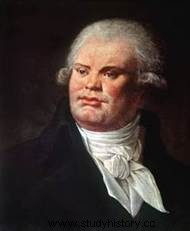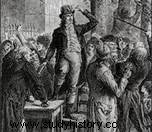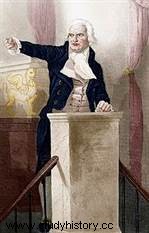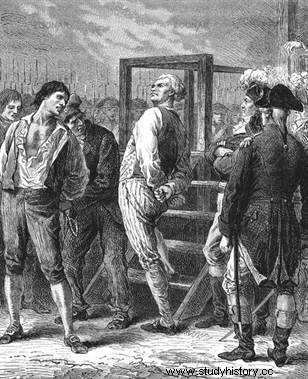 Georges Danton (1759-1794) was a French politician and one of the great figures of the French Revolution. Both idealistic and bon vivant sensitive to the advantages of money, Danton has long been opposed to Robespierre the virtuous, described as cold and psycho-rigid. A true force of nature, with a face of powerful ugliness that earned him the nickname of the Mirabeau of the scoundrel , Danton found in the revolutionary period the opportunity to develop his temperament overflowing with energy and quickly established himself as a popular tribune. Considered the savior of revolutionary France threatened by the European monarchies, he animated the patriotic resistance at the head of the government. Overwhelmed by the excesses of the Terror and accused of corruption, he will call for reason and reconciliation but will lose his final duel against Robespierre.
Georges Danton (1759-1794) was a French politician and one of the great figures of the French Revolution. Both idealistic and bon vivant sensitive to the advantages of money, Danton has long been opposed to Robespierre the virtuous, described as cold and psycho-rigid. A true force of nature, with a face of powerful ugliness that earned him the nickname of the Mirabeau of the scoundrel , Danton found in the revolutionary period the opportunity to develop his temperament overflowing with energy and quickly established himself as a popular tribune. Considered the savior of revolutionary France threatened by the European monarchies, he animated the patriotic resistance at the head of the government. Overwhelmed by the excesses of the Terror and accused of corruption, he will call for reason and reconciliation but will lose his final duel against Robespierre.
Danton, tribune of the Revolution
Georges Jacques Danto n, born October 26, 1759, is the son of a prosecutor of the bailiwick of Arcis sur Aube. Pupil of the Oratorians of Troyes then law student in Paris, lawyer at the King's Council (1787), nothing foreshadowed in Danton, so close to the heights of the Ancien Régime, a revolutionary commitment. However, from July 1789, the lawyer became politically involved and skillfully harangued the Parisian crowd. During the days of October, he called on his district, that of the Cordeliers, to take up arms. Having become president of the Cordeliers club, which he founded in May 1790, he constantly gained in popularity, in particular thanks to his qualities as a speaker.
 After the king fled to Varennes and the shooting at Champ-de-Mars (June-July 1791), the repression against fraternal societies and Danton's predilection for a monocameral constitutional monarchy forced him to go into exile in Great Britain. Returning to France the following autumn, he became administrator of the department of the Seine. After having sold his position as a lawyer (which provided him with a good income), he then became more and more involved in politics. Obtained at the end of 1791, the status of second deputy prosecutor of the Paris Commune is an important political promotion for the one who asserts himself as the rising figure of the Jacobins - to which the Cordeliers are affiliated.
After the king fled to Varennes and the shooting at Champ-de-Mars (June-July 1791), the repression against fraternal societies and Danton's predilection for a monocameral constitutional monarchy forced him to go into exile in Great Britain. Returning to France the following autumn, he became administrator of the department of the Seine. After having sold his position as a lawyer (which provided him with a good income), he then became more and more involved in politics. Obtained at the end of 1791, the status of second deputy prosecutor of the Paris Commune is an important political promotion for the one who asserts himself as the rising figure of the Jacobins - to which the Cordeliers are affiliated.
At the head of the revolutionary government
His role in preparing for the day of August 10, 1792, which marked the end of the monarchy, remains rather obscure. According to him, it was considerable. The day after the event, Danton joined the Executive Council. Minister of Justice, he was a real head of government. Keeping his composure in the beginning of panic caused by the invasion of the Prussians in Champagne, he revived the energies. During a famous speech in the Legislative Assembly, on September 2, 1792, he passionately called for the organization of the defense of Paris and France:"The tocsin which is sounding will spread throughout France . It is not an alarm signal, it is the charge on the enemies of the fatherland. To defeat them, gentlemen, we need audacity, more audacity, always audacity, and France is saved!
 The Battle of Valmy (September 20) wards off the threat and marks the Republic's first victory. However, he allows the September massacres to be committed (which he has long been accused of being the instigator). Yet it was the same man who then affirmed his unfailing attachment to freedom of thought and expression.
The Battle of Valmy (September 20) wards off the threat and marks the Republic's first victory. However, he allows the September massacres to be committed (which he has long been accused of being the instigator). Yet it was the same man who then affirmed his unfailing attachment to freedom of thought and expression.
Elected deputy for Paris to the Convention in September 1792, he would have liked to maintain the collaboration between Girondins and Montagnards, but the mistrust towards him of the chiefs of the Gironde, in particular of Madame Roland threw him back towards the Mountain. However, he does not share its extremism, except on the question of National Defence. Despite his moderation, he voted for the death of King Louis XVI in January 1793. The same month, he spoke at the Convention for the annexation of Belgium, invoking the theory of "natural borders".
Between terror and conciliation
Attacked by the Gironde, who denounced him, not without reason, as a bribery minister, he had to rely more and more on the Montagnards, although he was already in favor of compromise measures and the search for a negotiated peace. It was he who decided to create the Committee of Public Safety (April 6, 1793), of which he was to be, until July, the de facto president. He took no active part in the elimination of the Girondins, but allowed it to happen, as in September 1792. made secret overtures to the English Foreign Secretary, Lord Grenville.
Danton then enjoyed the same notoriety as Maximilien de Robespierre. But he suffered from the fact that he did not know how, at the head of the Committee of Public Safety, to establish a policy making it possible to muzzle the counter-revolutionaries. The Convention blames him, among other things, for not having been able to prevent the treason of Dumouriez despite the investigation with which he was charged in November 1792. As for his Jacobin co-religionists, they reproach him for his image of a bon vivant inclined to enrich himself. , a bias contrary to the idealization of revolutionary "virtue".
Danton's last fight
On July 10, 1793, Danton was eliminated from the Committee of Public Safety, where Robespierre entered. Enriched by the Revolution, remarried after a few months of widowhood with a young girl of seventeen, he moved away from politics for a while, which greatly harmed his popularity. When he returned to the Convention (November 1793), he opposed, like Robespierre, the policy of dechristianization unleashed by the extremists, but he himself aspired to the end of the Terror and the application of the Constitution of 1793. he advocates the return to a normal government, relying on the broadest layers of the bourgeoisie, guaranteed to survive thanks to the victories won at the borders by the revolutionary years at the end of the year 1793.
 With his friends, notably Camille Desmoulins, who was launching his club Vieux Cordelier, Danton launched a campaign in favor of the clemency. But the Jacobins resumed the attacks on his political amorality, launched a few months earlier by the Girondins. The Dantonists, denounced as the "Indulgent" faction, were shot just six days after the execution of the opposing Hebertist faction.
With his friends, notably Camille Desmoulins, who was launching his club Vieux Cordelier, Danton launched a campaign in favor of the clemency. But the Jacobins resumed the attacks on his political amorality, launched a few months earlier by the Girondins. The Dantonists, denounced as the "Indulgent" faction, were shot just six days after the execution of the opposing Hebertist faction.
On the night of March 29 to 30, 1794, Danton was arrested along with his friends, among others Desmoulins, Hérault de Séchelles, Fabre d'Églantine. Before the Revolutionary Tribunal, where he was brought on April 2, he defended himself with such energy that the Convention, fearing that his eloquence would turn the crowd upside down, hastily voted a decree allowing any defendant who insulted justice to be judged out of court. People. Without being able to make himself heard, he was therefore condemned to death and executed on April 5, 1794. “You will show my head to the people, he said to the executioner, it is worth it. »
Bibliography
- Danton:The Giant of the Revolution, by David Lawday. Albin Michel, 2012.
- Danton - Myth and History, by Michel Biard. Armand Colin, 2016.
- When Robespierre and Danton Invented France, by André Stil. Grasset, 1988.
To go further
- Danton, a film by Andrzej Wajda, starring Gérard Depardieu. Gaumont, 1983.
